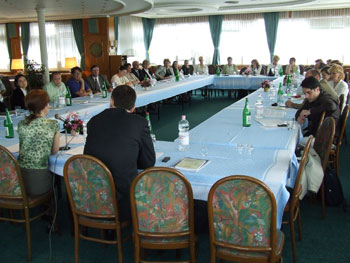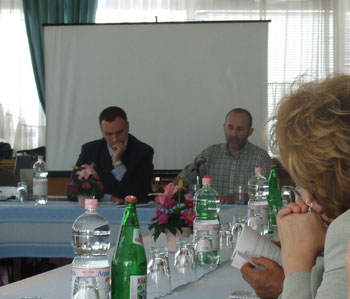

Round tables on forced mobilisation of refugees
![]()
| The International Aid Network and the Belgrade Centre for Human Rights have organized and conducted six round tables entitled FORCED MOBILISATION OF REFUGEES - LEGAL AND PSYCHOLOGICAL CONSEQUENCES. The round tables were held between April and June of 2005 in six towns. The venues were chosen to reflect geographical coverage, the specific towns and regions where refugees were forcibly mobilized on a larger scale, and the towns with a greater number of trials related to the issue - prosecutions of people charged with the illegal deprivation of freedom of refugees, and lawsuits seeking compensation of non-material damage incurred to the forcibly mobilized refugees. Some of the venues previously planned were changed with regard to these factors. |  |
 |
Representatives of the prosecution offices, competent courts, local governments and other state agencies, as well as lawyers, members of the media, and NGO representatives were invited to the round tables. The interest for participation in round tables was high, especially by the media. |
The conclusions and recommendations made at the round tables can be summarized in the following manner:
• The initiative to amend the legal position of the Supreme Court Civil Department is good, but the likelihood that the Supreme Court will uphold it is slim;
• Other political and legal modes of addressing the problem ought to be sought;
• State bodies, above all the National Assembly of the Republic of Serbia , must declare themselves on the issue;
• It would be extremely useful if a legal text regulating the entire array of issues related to the forced mobilization of refugees were drafted;
• The public ought to be continuously alerted to specific aspects of the problem;
• Additional pressure needs to be applied with respect to criminal proceedings where the police have been passive and averse to fulfilling their legal obligations;
• The possibility of the state being held accountable at the international level over judicial inefficiency and violation of the right to an effective legal remedy needs to be highlighted constantly.
Round table Possibility for realising human rights of refugees who were mobilized against their will before European Court for Human Rights was held on May 19 th 2006 in Belgrade - Palace Hotel.
The decision to organize the round table in Belgrade was made with the aim of targeting the real decision makers related to this issue. This especially refers to the Supreme court of Serbia, General Attorney of Serbia and Municipal Court of Belgrade (very important due to the fact that all the civil procedures concerning refugee compensation are being conducted by this Court only).
The participants came from the following organisations: Supreme Court of Serbia, Ministry of Human and Minority rights, Serbian Ministry of Justice, General attorney of Republic of Serbia, General Inspectory of Serbian Ministry of Interior, People's Office of the President of Serbia, Belgrade District Court, First Municipality Court in Belgrade, Belgrade Centre for Human Rights, Council of Europe, Vranje District Court , Pozarevac District Court, Serbian Prosecution Office, Serbian Democratic Forum--Belgrade, Serbian Democratic Forum-- Pakrac, Serbian Association of Judges and Serbian Commissariat for Refugees.
The round table began with an overall review of the problem. The participants were informed of the emergence of problems related to forced mobilization, advised of the legal status of aspects of mobilization, and presented with a list of national and international regulations violated by such mobilization. We stated the specific problems regarding the issue of prescription of the criminal procedure, which came as the consequence of the delay in state action.
The foreign human rights expert, Elica Grdinic, specifically presented the issues of the protection of refugees before the European Court of Human Rights. The responsibility of the state is found in its omission to conduct the prompt investigation of the matter starting from 2003 (the year in which Serbia became a member of the Council of Europe).
Emphasizing the fact that the state may be held liable before the European Court of Human Rights could produce changes in present attitude of the decision makers according to this matter.
During the discussion the participants suggested that one of the solutions for this issue could be a special law on compensation for the forcibly mobilized refugees.
The major difference from previous round tables is that not a single participant opposed the idea that forcibly mobilized refugees should have a legal opportunity for compensation.
Psychiatrists from IAN presented their findings regarding psychiatric and psychological effects of forced mobilization and torture on the forcibly mobilized refugees. The psychologists from IAN expressed their findings on previous round tables, and made the comparison with this round table, noticing the great change in attitude among participants towards this issue.
The reason for this is that seat of the Government is in Belgrade . Therefore in cases where the Republic of Serbia is being respondent, the Court in Belgrade is competent. The issue of criminal procedures is bit different, since the competence of the court is related to the territory where the crime was committed.
The reason for this is that seat of the Government is in Belgrade . Therefore in cases where the Republic of Serbia is being respondent, the Court in Belgrade is competent. The issue of criminal procedures is bit different, since the competence of the court is related to the territory where the crime was committed.
Home | About us | Departments | Publications | Events | Contact
International Aid Network, Admirala Geprata Street 10, 11000 Belgrade, Serbia, 011/ 7617 197 i 011/ 7617 205,
Copyright © 2007 International Aid Network, Belgrade, Serbia
Unless otherwise specified, all product names appearing in this Internet site are trademarks owned by or licensed to International Aid Network. No use of any International Aid Network trademark, trade name, or trade dress in this site may be made without the prior written authorization of International Aid Network, except to identify the product or services of the company.